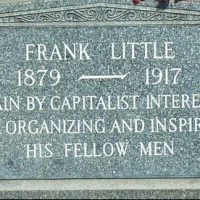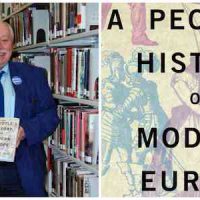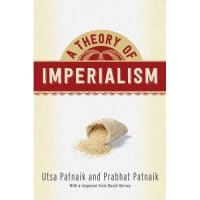-
OCTOBER: The Story of the Russian Revolution
Commenting on the many works on the Russian Revolution, China Mieville describes his book as: “… a short introduction for those curious about an astonishing story, eager to be caught up in the revolution’s rhythms. Because here it is precisely as a story that I have tried to tell it.”
-
100 years ago, a forgotten soviet revolution in LGBTQ rights
The socialist October Revolution in 1917 brought about fundamental, thoroughgoing changes in Russian society. Millions of people in the largest country on Earth quickly found themselves far freer than they had ever been under the despotic, anti-Semitic Tsar, the strictures of the church, and the brutality of Russian capitalism and landlordism.
-
Why Everything Costs Money
This year marks the 150th anniversary of the publication of Marx’s Capital. In the midst of a near-decade long world economic crisis, there has been a major resurgence in interest in the book.
-
The IWW saga in new light
Frank Little and the IWW is a family story—Jane Botkin’s own family story, as she rightly says. It is hers because she did not know anything about her great uncle growing up. She puts the story together, piece by piece, before our eyes, and that is large part of the pleasure of this text.
-
An oral history of the next American revolution
In this interview, author and activist Michael Albert discusses his new book, RPS/2044: An Oral History of the Next American Revolution.
-
From the old left to the new: perils of progressive parenting
When parents turn childhood into a left-wing boot camp, their kids are not likely to remain on the shining path of their own politics for long. In fact, when the personal gets too political, parent-child relationships can be poisoned with resentment, anger, and recriminations.
-
Building on the legacy of socialism
For LeBlanc socialism is inseparable from both political and economic democracy, and it follows that the continuous development of revolutionary theory and struggle is essential.
-
Criminalizing environmental activism
Berta Cáceres, assassinated in her home on March 3, 2016, was just one of hundreds of Latin American environmental activists attacked in recent years. At least 577 environmental human rights defenders (EHRDs) were killed in Latin America between 2010 and 2015—more than in any other region—as documented by Global Witness.
-
How American racism shaped nazism
Depending on the reader’s perspective, Whitman’s central argument seems either modest or bold, as he claims, “What all this research unmistakably reveals is that the Nazis did find precedents and parallels and inspirations in the United States” (10). The most radical Nazis were often the most enthused about American legal precedents. More moderate, less anti-Semitic members of the Nazi Party tended to be more skeptical of American approaches. For some Nazis, “American race law looked too racist” (5). America “was the leading racist jurisdiction” in the 1930s (138).
-
Soft shell, hard core: on the 150th anniversary of the publication of Karl Marx’s Capital, Vol. 1
In bourgeois economic theory, competition, commodity production, profit seeking, and growth express something like the human essence. They are ahistorical constants, not the results of specifically capitalist relations that have historically emerged and can therefore be overcome. This is exactly what makes Marx’s critique of economics highly topical.
-
Animal liberation, human liberation
The Left must endeavor to make visible the political valence of meat, let alone other industrial uses of animals. This act of acute empathy reveals the extent of one’s political imagination.
-
Making their own history
More than half a century ago, E. P. Thompson pioneered a new approach to labor history in The Making of the English Working Class. Thompson was dismayed with the bourgeois idea that history is made by great men, and the occasional princess or queen, but also frustrated with socialist histories that replace statesmen and business moguls with wise, if not infallible, party leaders and union bosses allegedly executing the iron laws of history.
-
Herbert Marcuse remembered
We are, the 1960s radical generation, now once more marching, marching, sometimes it seems mostly with the Millennials by our side. And here comes the ghost of Herbert Marcuse, who was so much with us the first time around.
-
A tale of many cities: potholes in the road to municipal reform
As a growing number of groups on the left have begun dabbling in local electoral politics—most notably via the Democratic Socialists of America (or DSA-backed candidacies)—we would do well to heed the warning of Juan Gonzalez about the “consultant class” (currently in the employ of Mayor de Blasio). The allure of corner-cutting political consultants, corporate cash, and the always pernicious influence of pay-to-play after any election day success by would-be reformers are pitfalls that left electoral efforts must avoid at all cost.
-
Mobilizing against the fascist creep
When economic crisis grips a nation, when contradictions within the ruling class and the state create instability and social upheaval, fascists act as the foot soldiers of capitalism. Their function is to disrupt and destroy efforts on the part of the working-class and oppressed masses to organize against their miserable conditions.
-
Book of the day: The Corruption of Capitalism by Guy Standing
I recommend this book, along with the rest of Standing’s body of work, as an example of the kind of outside-the-box thinking the Left needs in place of the dinosaur Old Left’s organization and policy models if it is to be relevant to the new economy.
-
The politics of everybody
Class is primary—not in the sense of more important, but in the sense of being the limit, the foundation, the point where profit is extracted and the point where it can be challenged. The centrality of class is tactical, not moral.
-
W. E. B. Du Bois’s revolutions
“Capitalism cannot reform itself; it is doomed to self-destruction. No universal selfishness can bring social good to all. Communism—the effort to give all men what they need and to ask of each the best they can contribute—this is the only way of human life.” With this sober stroke of his insurgent pen, the 93-year-old scholar joined the Communist Party.
-
The continental revolution
Between the end of the Civil War and the early 20th century, the United States underwent one of the most profound economic transformations that any country has ever experienced. In 1865, the United States lagged far behind Britain in manufacturing output; by 1900, it would surpass the totals of Britain, France, and Germany combined.
-
New Perception of Imperialism
If accumulating wealth is the basic objective of capitalism, organising production using wage labour is only one of the ways it can be achieved. What finance does is to open an alternative route to reach the same objective, that is via transaction.




















